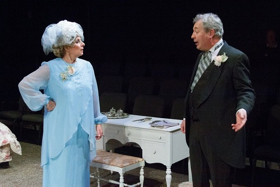Review: Laughs at The Belmont With PLAZA SUITE

Back in the days when you knew a Broadway show would be a hit, you didn't have eight weeks of previews. Neil Simon had written PLAZA SUITE, Mike Nichols directed it in 1968, George C. Scott and Maureen Stapleton were in it. It had two previews and then ran for over a thousand performances. It had multiple Tony nominations, Simon only lost out on best play because of Samuel Beckett, and Noel Coward swore that Simon had swiped the idea from him. That's not too shabby. PLAZA SUITE was Simon's idea of multiple stories about one hotel room, in this case Suite 719 at the Plaza, and the lives of its visitors.
PLAZA SUITE is also a bittersweet comedy, starting with the bitter and winding up with hilarity, that examines the marriages of the late 1960s and early 1970s backwards, from breakup to trying to get the wedding off the ground, told in three short stories. It's currently being told at the Belmont Theatre in York, where Joel Persing's take on the show is firmly rooted in its time. Although many directors attempt to update the show, hoping to make it "feel relevant," its stories are in many ways timeless, but Persing also realizes that parts of it are products of a very specific generation.
In the first one-act play, "Visitor From Mamaroneck," Karen Nash, played by Lisa Lawmaster Hess, arrives at the suite hoping to lure her husband Sam, Paul Lajkowicz, into anniversary romance. In the way that marriages could fail spectacularly for the most mundane reasons in the era, theirs is falling apart. When the play was written, Sam's callous "I'm working" behavior and correction of every word from Karen's mouth was seen as humorous; today, the vignette is tragic with comedic moments, and Persing wisely rolls with those facts, while Hess maintains Karen's dignity through the hardest role in the entire show.
In the second, "Visitor From Hollywood," Muriel Tate, a New Jersey housewife, is confronted by her high school boyfriend, Jesse Kiplinger, now a successful Hollywood producer. Erin Wright is endearing as Muriel, whose protests of her very happy marriage change as the amount of vodka in her increases. Jesse's bent on seducing Muriel, who appears only to want to hear Hollywood gossip, or is that really what's happening? While most people find the last act the funniest in the show - it's certainly the most vaudevillian - this writer always has been particularly taken with "Visitor From Hollywood," which really highlights the differences between men's and women's takes on what's romantic. Had Sam Nash learned from the lesson of Jesse and Muriel, the first act would have been far different.
The show closes with the beginning of marital discord - the wedding itself. Greg and Christine Koslosky play Roy and Norma Hubley, a middle-aged society couple trying to marry off their recalcitrant daughter Mimsey, played by Jessica Oakham (who also plays Sam's secretary in the first act). Mimsey's locked in the bathroom because she's afraid of marriage - it's just dawned on her that she could wind up like her parents. Greg Koslosky takes over the physical comedy that Hess had in the first act, and takes it to wild lengths, attempting to break down doors and climb along building ledges in attempts to budge Mimsey.
Mike McGuinness appears in all three parts, variously as a bellhop, a waiter, and as Mimsey's fiancé, who rescues her from her self-absorption with two words.
PLAZA SUITE may or may not hold out hope for American marriage, but it does hold out hope that there's a sense of humor out there to survive the institution. Persing's take allows the laughs to build. At the Belmont through the 21st. Visit thebelmont.org for tickets and information.
Reader Reviews
Videos

